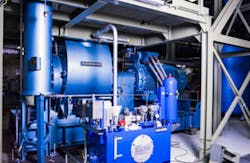New Project Investigates Accuracy of Flowmeter Technology for Phase Contaminated Oil Flows
DNV GL, The Netherlands-based company that offers technical advisory services to the oil & gas industry, has initiated a project to assess the capability and feasibility of Coriolis and ultrasonic flowmeter technology for phase contaminated oil flows.
DNV GL says despite limited evidence of the performance of Coriolis and ultrasonic flowmeter technology, it is being increasingly deployed for single-phase oil flows contaminated with water or natural gas. DNV GL has initiated a Joint Industry Project (JIP), now open for industry partners, Exploration & Production companies, and manufacturers to join.
Coriolis and ultrasonic flowmeters are widely accepted for application in single-phase oil flows by the oil industry. However, there is little validation nor independent test results to support the claim that they produce accurate allocation measurement results, DNV GL says. Inaccurate results related to the oil flow can present both operational and financial risks by negatively influencing decision-making and understanding of operational efficiency. According to DNV GL, the JIP will therefore provide testing guidelines, a performance assessment and correction algorithms as a foundation for using Coriolis and ultrasonic flowmeters for phase contaminated oil flows.
READ ALSO: Coriolis Flow Measurement – Past, Present & Future
"Accurate measurement of the production of oil fields is an important means of reducing the financial risks that Exploration & Production (E&P) companies face in allocation processes," said Dennis van Putten, Expert Multiphase Flow Metering, DNV GL – Oil & Gas. "Yet more and more we see the application of these meters in phase contaminated oil flows, despite limited evidence of their performance. There is still a lack of common understanding of the multiphase phenomena within the industry and no systematic approach to the use of these technologies in such conditions. Biases will occur in phase contaminated flows and an accepted correction algorithm is required as an important step towards qualifying Coriolis meters and ultrasonic flow meters in these situations."
To achieve this correction algorithm, a test program will be performed under conditions close to real field situations (oil /water/ natural gas mixtures). These conditions can be created in DNV GL’s Multiphase Flow Facility in Groningen, The Netherlands, which opened in 2013.
READ ALSO: Flowmeters for Oil & Gas Measurement
Bert Tinge, Senior Business Development Manager, DNV GL – Oil & Gas, said the company has already seen a great deal of interest in this project from the industry and Coriolis and ultrasonic flowmeter manufacturers are participating in the JIP. "The value for E&P companies in joining this JIP is in finding solutions which can mitigate the large financial risks present in production allocation systems," Tinge said. "By being part of the project, the manufacturers will gain valuable insight into the performance of their own technology under single-phase conditions contaminated with small fractions of water and gas. The JIP will provide them with a route to broad industrial acceptance and corresponding access to the market."
DNV GL says industry partners, E&P companies and manufacturers interested in taking part in the JIP are invited to join the launch meeting on June 24, 2015 at Amsterdam Airport Schiphol in The Netherlands.


